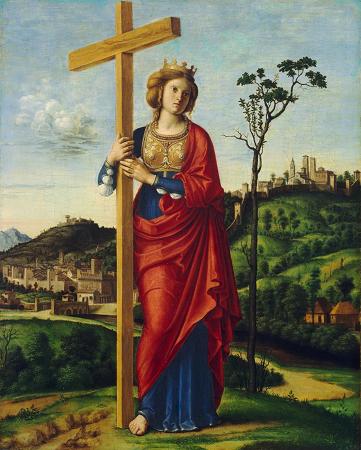Saint Bonaventure. Bonaventure, born Giovanni di Fidanza, was an Italian medieval Franciscan, scholastic theologian and philosopher. The seventh Minister General of the Order of Friars Minor, he was also Cardinal Bishop of Albano. He was canonised on 14 April 1482 by Pope Sixtus IV and declared a Doctor of the Church in the year 1588 by Pope Sixtus V. He is known as the Seraphic Doctor. His feast day is July 15. Many writings believed in the Middle Ages to be his are now collected under the name Pseudo-Bonaventure. He was born at Bagnoregio in Umbria, not far from Viterbo, then part of the Papal States. Almost nothing is known of his childhood, other than the names of his parents, Giovanni di Fidanza and Maria di Ritella. He entered the Franciscan Order in 1243 and studied at the University of Paris, possibly under Alexander of Hales, and certainly under Alexander's successor, John of Rochelle. In 1253 he held the Franciscan chair at Paris. A dispute between seculars and mendicants delayed his reception as Master until 1257, where his degree was taken in company with Thomas Aquinas. Three years earlier his fame had earned him the position of lecturer on The Four Books of Sentences, a book of theology written by Peter Lombard in the twelfth century, and in 1255 he received the degree of master, the medieval equivalent of doctor. After having successfully defended his order against the reproaches of the anti-mendicant party, he was elected Minister General of the Franciscan Order. On 24 November 1265, he was selected for the post of Archbishop of York; however, he was never consecrated and resigned the appointment in October 1266. During his tenure, the General Chapter of Narbonne, held in 1260, promulgated a decree prohibiting the publication of any work out of the order without permission from the higher superiors. This prohibition has induced modern writers to pass severe judgment upon Roger Bacon's superiors being envious of Bacon's abilities. However, the prohibition enjoined on Bacon was a general one, which extended to the whole order. Its promulgation was not directed against him, but rather against Gerard of Borgo San Donnino. Gerard had published in 1254 without permission a heretical work, Introductorius in Evangelium aeternum. Thereupon the General Chapter of Narbonne promulgated the above-mentioned decree, identical with the constitutio gravis in contrarium Bacon speaks of. The above-mentioned prohibition was rescinded in Roger's favour unexpectedly in 1266. Bonaventure was instrumental in procuring the election of Pope Gregory X, who rewarded him with the title of Cardinal Bishop of Albano, and insisted on his presence at the great Second Council of Lyon in 1274. There, after his significant contributions led to a union of the Greek and Latin churches, Bonaventure died suddenly and in suspicious circumstances. The 1913 edition of the Catholic Encyclopedia has citations that suggest he was poisoned, but no mention is made of this in the 2003 second edition of the New Catholic Encyclopedia. The only extant relic of the saint is the arm and hand with which he wrote his Commentary on the Sentences, which is now conserved at Bagnoregio, in the parish church of St. Nicholas. He steered the Franciscans on a moderate and intellectual course that made them the most prominent order in the Catholic Church until the coming of the Jesuits. His theology was marked by an attempt completely to integrate faith and reason. He thought of Christ as the one true master who offers humans knowledge that begins in faith, is developed through rational understanding, and is perfected by mystical union with God. Bonaventure's feast day was included in the General Roman Calendar immediately upon his canonisation in 1482. It was at first celebrated on the second Sunday in July, but was moved in 1568 to 14 July, since 15 July, the anniversary of his death, was at that time taken up with the feast of Saint Henry. It remained on that date, with the rank of double, until 1960, when it was reclassified as a feast of the third class. In 1969 it was classified as an obligatory memorial and assigned to the date of his death, 15 July. Bonaventure was formally canonised in 1484 by the Franciscan Pope Sixtus IV, and ranked along with Thomas Aquinas as the greatest of the Doctors of the Church by another Franciscan, Pope Sixtus V, in 1587. Bonaventure was regarded as one of the greatest philosophers of the Middle Ages. His works, as arranged in the most recent Critical Edition by the Quaracchi Fathers, consist of a Commentary on the Sentences of Lombard, in four volumes, and eight other volumes, including a Commentary on the Gospel of St Luke and a number of smaller works; the most famous of which are The Mind's Road to God, an outline of his theology or Brief Reading, Reduction of the Arts to Theology, and Soliloquy on the Four Spiritual Exercises, The Tree of Life, and The Triple Way, the latter three written for the spiritual direction of his fellow Franciscans. The German philosopher Dieter Hattrup denies that Reduction of the Arts to Theology was written by Bonaventure, claiming that the style of thinking does not match Bonaventure's original style. His position is no longer tenable given recent research: the text remains indubitably authentic.
more...



